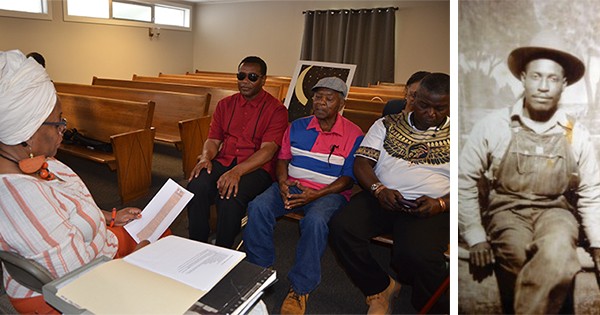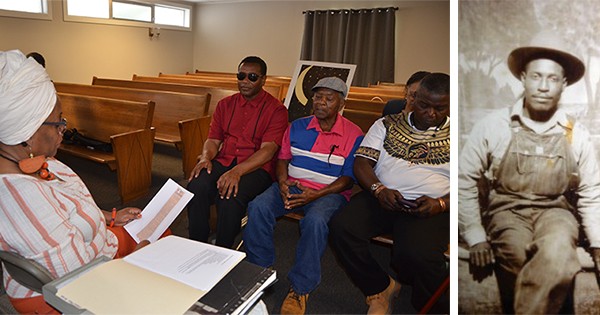
Nationwide — Peonage Detective Dr. Antoinette Harrell has revealed through her research that the legendary civil rights activist, Louis Allen, was sold for $20 before his untimely death in 1926. Her research on peonage included a trip to the National Archives in Washington, D.C., where she was particularly interested in the cases in the southern states. In contrast, she examined the documents carefully, looking at and analyzing each one with a methodical and logical approach. There was a newspaper clipping published by the Associated Press, New Orleans, Feb 3, 1926, entitled “Two Accused of Selling Negro Family” which quickly caught Harrell’s attention to dig deeper into this story related to Tangipahoa Parish, Louisiana.
In an article featured in the newspaper, Crawford Allen, his wife, and three children were kidnapped in Amite County, Mississippi, and sold to a farm in Fluker, Louisiana, for the sum of $20. As a result, Harrell began to go around the rural area in search of older people who might have heard about this story. A number of older members of the community remember hearing about a family who was kidnapped from Mississippi and sold to the Kent farm in Fluker.
For twenty years, Harrell sat on this case with hopes that she would get a lead on the Allen family and she finally did. In order to contribute to family history discussion, Harrell produces an educational genealogy Zoom session each week called “Nurturing Our Roots”. A few hours after she had completed the presentation about the Allen family, Eric Williams called her to inform her about Crawford Allen’s relationship to Louis Allen. The question that Williams asked Harrell was if she was aware that Crawford Allen was the father of the legendary civil rights icon Louis Allen, who was murdered in 1964 at a cotton gin in Liberty, Mississippi by E.J. Williams. H. Hurst, a white legislator? As a result of witnessing the murder of Herbert Lee in 1961, Louis discussed the matter with federal officials, and that was the beginning of the harassment by the sheriff of Liberty against Allen. Mississippi.
Having a breakthrough after twenty years had been a dream come true for Harrell. She sent an email to Cynthia M. Deitie, the director of the Matthew Shepard Foundation for Civil Rights to inform her that Louis Allen was one of the people who was sold for $20 in 1926. In fact, after the foundation gave the Allen family Harrell’s contact information, the next day, Harrell received a phone call from Louis Allen’s grandson, also named Louis Allen. The name “Louis” is derived from the name of his grandfather. It was after a lengthy conversation with Harrell that they decided it would be best for Harrell to break the news to the family in person.
Harrell met with Louis Allen’s son Henry “Hank” Allen, as well as his sons, daughter, and grandchildren. Harrell asked Henry about his grandparents, Crawford and Anna. She wanted to know what happened to the other two children who were sold. Harrell provided documents as well as a printout from TIME Magazine‘s news section “Negroes: Black Bodies” from February 14, 1927, showing his father and two aunts, which he confirmed were his family members. As Harrell and the Allen family were upset about the children being called aliens and pickaninnies, Harrell and the Allen family ex-pressed their distress. According to Harrell, TIME owes the Allen family an apology for its conduct in addressing the children in just a derogatory manner.
Harrell gave them the name of two white men named John D. Alford and Webb Bellue who kidnapped and sold the Allen family. Her next question was whether Henry had heard anything about this. No, daddy always said that his father told him they sold poppa. “He never said that he was sold to anyone,” Henry replied.
As a result of Abraham Lincoln’s signing of the Emancipation Proclamation in 1863, many newly freed people, who had been enslaved, were now free. There was a Proclamation of Juneteenth that became a national holiday and it was celebrated across the United States by African Americans enslaved in Galveston, Texas, who did not receive their freedom until 1865.
The Peonage Detective, Harrell, however, was able to gather enough evidence to prove that many people such as the Allen family were forced into slavery during the 20th century. The freedom of Mae Louise Walls Miller and her brother Arthur Walls didn’t come until 1963, just as it didn’t come to hundreds of thousands of others in the south at different times.
In any case, the Allen family was grateful Harrell shared the information with them about their family with them. Henry found his father under the truck with a bullet hole in the head. The Allen family wanted Harrell to show them the site where his father, grandparents, and aunts were sold. In a picture, Henry shared with Harrell, Crawford, Anna, and his aunts were seen together. For the first time, Harrell saw a picture of Crawford, Anna, and the two girls who were sold.
To learn more about Dr. Antoinette Harrell and her work as a respected historian and researcher, visit PeonageDetective.com
For press inquiries, contact [email protected] or 504-858-4658.
Get the Latest Black News and Press Releases In Your Email FREE
|
|
Your Email Address Here
Follow us on: Twitter and Facebook
Also check out: HBCUconnect.com
Copyright © 2001-2021 Dante Lee International | All Rights Reserved.

